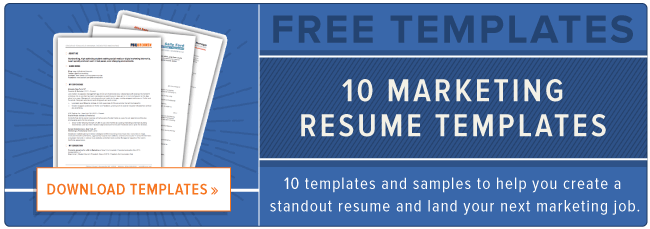 Most people I talk to that lean on content marketing for their business don't consider themselves content marketers themselves. Either they're not inherently talented as writers, or they're just not interested in doing it -- whether due to resource constraints or a lack of inclination toward the written word.
Most people I talk to that lean on content marketing for their business don't consider themselves content marketers themselves. Either they're not inherently talented as writers, or they're just not interested in doing it -- whether due to resource constraints or a lack of inclination toward the written word.
That's totally fine. As long as they're ready to hire writers that can do the job for them.
Personally, I fall into both camps. I like writing, and I do it a lot, but our team has grown to require more than just one writer. As such, I've screened thousands of writers' resumes -- and I've come up with a process that helps me identify fantastic writers that are great fits for particular subject matters, all while keeping my sanity shuffling through all those applications.
Here's the process I recommend. I've been using it for about five years now and it hasn't failed me yet.
Create a detailed job description (and job title) that's reflective of the work they'll be doing.
There are a lot of different roles someone in content marketing might take. Staff Writer. Editor. Copywriter. Content Marketer. Ghostwriter. Copyeditor. Editorial Assistant.
And all of these roles require slightly different skill sets, too. Does your candidate have to be good at both writing and marketing the content they create? Will they be doing long form content or short form content? (Or both?) Will they have to manage contributors? Will they work with "difficult personalities" as they research and interview? Will they even have to do interviews? Should they be a skilled editor? Proofreader? How quickly do they need to turn drafts around?
... See what I mean? There's a lot to consider. Make sure you've written a job description that details precisely what you're looking for in a candidate -- with a title that reflects that repsonsibility -- so you attract the right kind of talent (and solidify it in your own mind, too.)
Do a quick thinning out of applicants.
I have good news and bad news. The good news is that there are a lot of people out there who want to make a living writing. The bad news is you'll hear from all of them -- and that's a lot of resumes to weed through. Here's how I sort through the initial burst of applications:
- Ignore those who didn't follow application instructions. Content roles typically require a high attention to detail, and inability to follow basic instructions when one should be putting their best foot forward is a red flag.
- Ignore those with typos in their application, email, resume, or cover letter. For other roles, I might look past these. But for an application to a content position, this isn't a good way to start.
Further refine the applicant pool based on cues from their application, email, resume & cover letter.
If you're still left with a formidable pile of applications after your initial thinning, here's a simple way to further refine the pool: Take the remaining applicants and do a quick readthrough of their application, email, resume, and/or cover letter to look for strange sentences, phrasing, or structure.
This is a step above and beyond just checking for typos, grammatical errors, or misspellings, but also offers relatively quick insight into an applicant's writing ability before you dive into their writing samples. You can remove from consideration those that don't meet your quality standards.
Prioritize and review applications & writing samples.
Now that you've thinned the herd a bit, it's time to review writing samples from your remaining applicants. I find it helpful to prioritize the writing samples based on a few criteria:
- Experience - Does the applicant have relevant experience that will help them be a great writer and team member at your company?
- Tone & Personality - Based on their email, cover letter, application, and/or resume, does the applicant seem like someone you'd like to work with?
Prioritize those with excellent experience and those that seem like a good culture and organizational fit. Then, read their writing samples and look for a few key ingredients:
- Relevant Topic - Did the applicant choose a topic that aligns with what your business writes about?
- Subject Matter Expertise - Did the applicant write about the subject matter accurately? Did they demonstrate a high level of subject matter expertise?
- Writing Ability - Is the piece easy or enjoyable to read? Are complex topics explained clearly?
- Details - Does the piece go above and beyond in any way? Does it draw on data to make points, and cite that data correctly? Does it draw on well-researched examples? Does it include quotes from industry experts? Is it formatted in an easy-to-read manner?
Tip: Something I like to look for, particularly when screening writers for complex (dare I say "boring") subject matters, is the applicant's ability to switch tones. Compare the tone used in their email or application to the tone they use in their writing sample(s). Their ability to adopt a few different tones shows their command of and comfort with language.
Google them.
By now, you should have a few top contenders that hit all the marks. They're talented writers, possess a strong command of the subject about which they write, and have a personality that seems like it will mesh well with your team and organization. Before advancing, head over to Google to see if some candidates rise above the rest (or sink below) based on their online footprint. Here are the things I look for:
- Social Activity - Does the writer have an active social presence full of quality content?
- Social Reach - Does this writer have a large social reach? This isn't a must-have, but it certainly doesn't hurt. Plus, it may be indicative of their content chops, whether as a curator or creator.
- Blogging/Writing Activity - Where else does this writer write? Does he have his own site that he writes for? If so, how frequently? Does she contribute to other sites? If so, what does she write, and for whom? More importantly, how good is it?
Finally, ask for an original writing sample.
Once you're ready to move forward with your top applicant(s), I recommend requesting an original writing sample. This is important because it's incredibly difficult to verify that the submitted samples are fully representative of the candidate's writing ability. Many sites put content through one or several rounds of editorial, and the final product looks and reads very different than the original draft the writer submitted. Without a writing "test" of sorts, it's difficult to know whether an applicant is capable of producing at a certain quality level without leaning too hard on an editor.
Here's the way I like to run these tests to ensure both the applicant and the hiring manager are getting a fair shake:
- Only give this test to writers you're seriously considering hiring.
- Whether you hire the writer or not, let them retain rights to the sample content they produce. They should be able to publish it on their blog or website even if you don't hire them for the role.
- Set a deadline. It's difficult to safeguard entirely against the chance of editorial help, but a tight turnaround time helps a bit. I recommend 24-48 hours barring extenuating circumstances on the part of the applicant.
- Provide three to five working titles from which to choose. This helps set the applicant up for success in two ways: It ensures they're writing about a topic you'd actually like to see, and it lets them choose a topic that highlights their own writing and research strengths.
- Provide loose giudelines for the writer to follow. Too strict, and you won't get an idea for their decision-making abilities. Too loose, and you're not setting proper expectations with the writer -- and you probably won't get what you're looking for as a result.
The result of your writing sample probably won't be perfect. It might not be style guide compliant. It may have a couple positioning issues. But these are all teachable things. If the sample you get back shows an in-depth understanding of the subject matter and clear writing prowess, congratulations -- you might have just found your next content hire!


![10 Creative Company Profile Examples to Inspire You [+ 12 Templates]](https://www.hubspot.com/hubfs/Untitled%20design%20%2857%29.jpg)



![15 Hiring Trends to Watch in 2024 [Marketing Leader Data]](https://www.hubspot.com/hubfs/recruitment%20team%20studying%20hiring%20trends%20for%20upcoming%20talent%20search%20in%202023.jpg)




